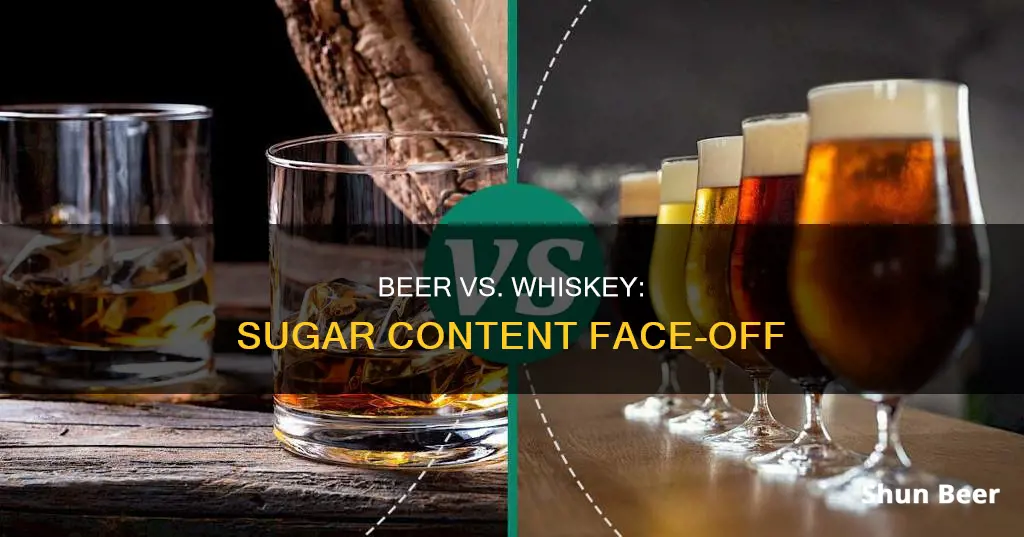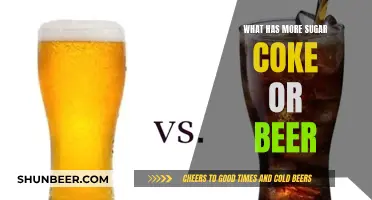
Alcoholic drinks can contain varying amounts of sugar, and it can be challenging to determine their exact sugar content due to voluntary nutrition labelling by manufacturers. Beer typically has a higher carbohydrate content per serving than wine or liquor, but it contains no added sugar. Regular beer contains 12 grams of carbohydrates per serving, while light beer has approximately 6 grams. Whiskey, on the other hand, is a distilled spirit that loses any sugar from the grains used during the distillation process, resulting in zero sugar and carbohydrates per serving. Therefore, when comparing beer and whiskey, whiskey has less sugar, and opting for distilled spirits over beer can be a better choice for those conscious about their sugar intake.
What You'll Learn

Beer has no added sugar but is high in carbohydrates
Beer is often associated with a "beer belly", but contrary to popular belief, beer does not contain any added sugar. However, it is important to note that beer is high in carbohydrates, which can contribute to weight gain and impact blood sugar levels.
The average 12-ounce serving of beer contains approximately 13 grams of carbohydrates, which is higher than the carbohydrate content of wine or spirits. The specific carbohydrate content can vary depending on the type of beer. For example, lager and wheat beers tend to be lower in carbohydrates compared to heavier beers such as ales, stouts, and porters. Stouts, Porters, and Guinness can have upwards of 20 grams of carbohydrates per pint, while light beers typically have less than 10 grams of carbohydrates per pint.
The high carbohydrate content in beer is due to the fermentation process, where sugars from the grains are converted into alcohol. While the sugar is transformed, the carbohydrate content remains, contributing to the overall carbohydrate count in beer.
Beer's lack of added sugar sets it apart from mixed cocktails, which can contain significant amounts of sugar from ingredients other than the alcohol itself. For example, a 4-ounce pina colada can contain up to 28 grams of added sugar, and a 4-ounce daiquiri can have 6.7 grams. These sugary cocktails can contribute to weight gain and increase the risk of dental decay, making beer a potentially better option for those conscious of their sugar intake.
Additionally, beer offers some nutritional value. The brewer's yeast used in fermentation contains B vitamins, which can benefit nervous system health and reduce homocysteine, a chemical associated with cardiovascular disease.
Beer and Sugar: What's the Connection?
You may want to see also

Whiskey has no sugar but is high in calories
While beer does contain more sugar than whiskey, both drinks can be part of a healthy diet when consumed in moderation. Whiskey, a distilled spirit, contains no sugar and has zero carbs, making it a diet-friendly option. However, it is essential to consider the number of calories in whiskey, as excessive consumption can lead to weight gain.
Whiskey, like other distilled spirits such as vodka, gin, and rum, undergoes a distillation process that removes the sugar from the grains used during fermentation. This results in a beverage that is high in alcohol content but contains no carbohydrates or sugar.
Although whiskey has no sugar, it is essential to consider its calorie content. The standard 1.5-ounce serving of whiskey contains approximately 105 calories. While this may not seem like a significant amount, the calories in alcohol are considered empty calories. This means that these calories provide no essential vitamins or minerals, and consuming too many of them can lead to weight gain over time. Therefore, while whiskey may be a good choice for those watching their sugar intake, it is crucial to consume it in moderation to maintain a balanced diet.
When it comes to alcohol consumption, moderation is key. The recommended intake is no more than one drink per day for women and no more than two drinks per day for men. By sticking to these guidelines, individuals can enjoy whiskey while maintaining a healthy lifestyle. Additionally, it is worth noting that the mixers used in cocktails can significantly impact the overall sugar and calorie content of the drink. Opting for sugar-free mixers, such as club soda or diet tonic water, can help reduce the number of empty calories consumed.
In conclusion, while whiskey has no sugar, its calorie content should not be overlooked. By understanding the nutritional profile of whiskey and practicing moderation, individuals can make informed choices that align with their health and fitness goals.
Beer and Sugar: The Sweet Truth About Beer
You may want to see also

Beer has more carbohydrates per serving than wine or liquor
Alcoholic drinks can be a significant source of calories and carbohydrates, but the sugar content is generally low. The sugar content of alcoholic drinks is difficult to determine as nutrition labelling by alcohol manufacturers is voluntary. However, it is known that beer has a higher carbohydrate content per serving than wine or liquor.
Regular beer contains 12 grams of carbohydrates per serving, but zero grams of sugar. Light beer has fewer carbohydrates, with approximately 6 grams of carbohydrates per serving and less than half a gram of sugar. Therefore, light beer may be a healthier option.
Lagers and wheat beers tend to be lower in calories and carbohydrates per serving compared to ales, stouts, and porters. Stouts, Porters, and Guinness can have upwards of 20 grams of carbohydrates per pint. Real ales typically have 10 to 20 grams of carbohydrates per pint, but this can vary depending on additional flavouring.
Wine also has a lower carbohydrate content than beer. A dry wine can have as little as 1-2 grams of carbohydrates in a 200ml glass, while a sweet wine can have over 10 grams. A medium sweetness wine will likely have 5 to 10 grams of carbohydrates per standard glass. Fortified wines, such as port, can contain up to 20 grams of carbohydrates per glass.
Spirits such as gin, rum, whiskey, and vodka have no carbohydrates or sugar per serving, regardless of the alcohol proof. This is because the sugar content of the fruit and grains used to make liquor is lost during the distillation process. However, liqueurs have a much higher sugar content, with many containing at least 10 grams of sugar per ounce.
Budweiser Beer: Sugar Content and Nutritional Facts
You may want to see also

Whiskey is a distilled spirit, so it has no sugars or carbohydrates
Alcoholic drinks can be a significant source of calories and carbohydrates, but the sugar content is usually low. However, the sugar content can be difficult to determine because nutrition labelling by alcohol manufacturers is voluntary. The Alcohol and Tobacco Tax and Trade Bureau's requirements for nutrition labels include carbohydrate content but not sugars.
However, liqueurs have a much higher sugar content than distilled spirits. Many liqueurs contain at least 10 grams of sugar per ounce, and some contain upwards of 15 grams of sugar per shot. Liqueurs are made by infusing liquor with the flavours of fruits and spices and then adding sugar.
When it comes to mixers, it is important to be mindful of their sugar content as well. For example, orange juice and other juices contain about 20 grams of carbohydrates in a small 200ml serving. Tonic water and soda also contribute to the overall sugar content of a drink.
In summary, whiskey, as a distilled spirit, contains no sugars or carbohydrates. However, when consuming whiskey or any other alcoholic beverage, it is important to consider the mixers used and their potential impact on the overall sugar content of the drink.
Beer vs. Chardonnay: Which Has More Sugar?
You may want to see also

Beer and whiskey are both linked to changes in blood sugar levels
Alcohol can have a confusing effect on blood sugar levels. While beer and whiskey do not contain added sugar, the body's metabolism of sugar and carbohydrates when alcohol is present differs from the norm. Alcohol blocks the liver's release of blood sugar-regulating hormones, which can lead to hypoglycemia, or low blood sugar. This effect is especially relevant for individuals with diabetes. As such, people with diabetes are often advised to eat something when drinking to compensate for the expected drop in blood sugar levels.
The sugar content in beer is lower than in wine or liquor, but beer has a higher carbohydrate content per serving. A regular beer has 12 grams of carbohydrates per serving, while a light beer has approximately 6 grams. Stouts, Porters, and Guinness tend to be on the higher end of the carbohydrate spectrum among beers and can have upwards of 20 grams of carbohydrates per pint. Pilsners, on the other hand, are thought to have a relatively benign effect on blood sugar.
Whiskey, like other spirits such as gin, rum, and vodka, is highly distilled and does not contain any carbohydrates or sugar per serving. This is true regardless of the alcohol proof, as the sugar content of the grains used to make whiskey is lost during the distillation process.
It is worth noting that the mixers used in cocktails can significantly increase the sugar content of a drink. For example, for every ounce of soda, tonic water, or juice, there is approximately 4 grams (or a teaspoon) of sugar. Therefore, when it comes to blood sugar levels, it is important to consider not only the alcohol but also any mixers that may be added.
Beer Sugar Content: Is It Really That High?
You may want to see also
Frequently asked questions
Beer does not have added sugar, whereas whiskey has zero carbs. However, beer has a higher carbohydrate content per serving.
Regular beer has 12 grams of carbohydrates per serving but zero grams of sugar. Light beer has approximately 6 grams of carbohydrates per serving and less than half a gram of sugar.
Whiskey, like other spirits, is highly distilled and should not contain sugars.







